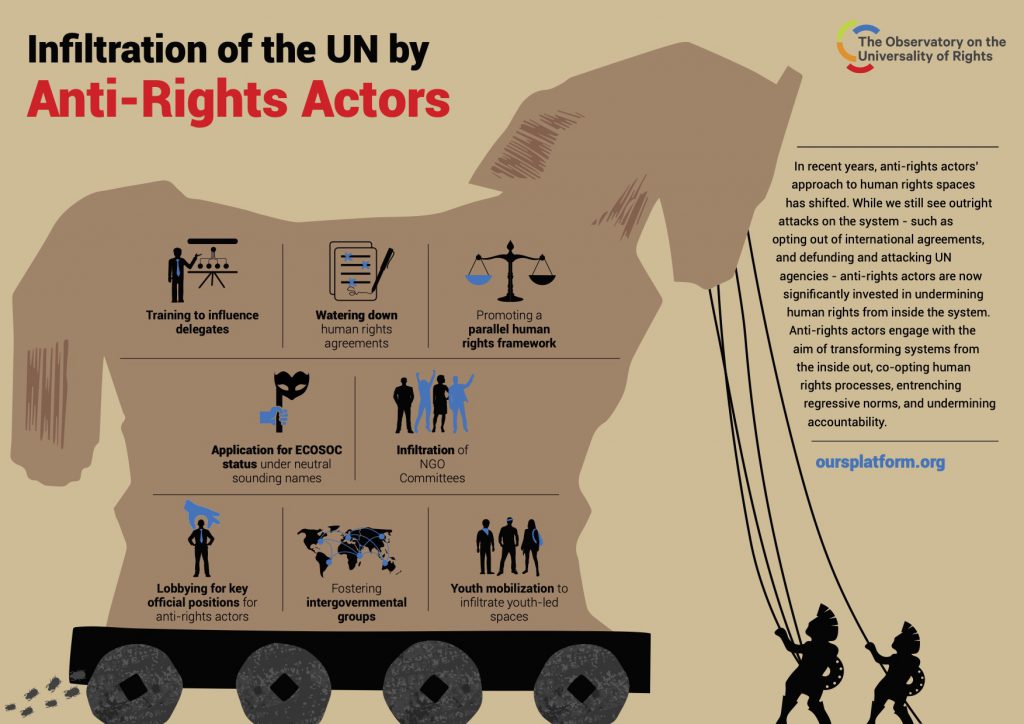Archives: Resources
Resources to be listed in Resources section page(s)
Gender Ideology Narratives: A Threat to Human Rights
“Gender ideology” narratives are increasingly present in public discourse and policy-making spaces,
posing a significant threat to human rights. The malleable concept of “gender ideology” casts
advocates of gender and social justice as illegitimate proponents of a nefarious agenda.
For decades, feminist scholars and advocates have articulated important concepts related to gender
to understand and challenge oppression and discrimination. Those concepts have now become
the target of anti-rights actors who claim that oppressive patriarchal gender roles are “common
sense”, strategically painting all other ideas, cultural norms, and forms of social life as a dangerous,
conspirative ideology.
Comic: Feminist Superhero Busts Anti-Rights Myths

Rights At Risk: A Primer
Anti-rights actors’ infiltration of the UN – Spot key groups and debunk their narratives
In human rights systems, anti-rights actors are now operating with increased frequency, coordination, resources, and impact. These actors are chipping away at the very content and structure of our human rights concepts, institutions, and protections – with disastrous consequences for human rights and gender justice. Anti-rights actors form a complex web across national and international spaces. They are often able to sustain their work through large budgets, in many cases from obscure sources.
Anti-rights actors are moving away from using explicitly regressive language, and co-opt human rights language and social justice issues to gain legitimacy. This primer is designed to help you spot some of the key anti-rights groups active in international spaces, and recognize and debunk some of their common discourses. The primer is derived from the Observatory on the Universality of Rights (OURs) Trends Reports, Rights at Risk and Rights at Risk: Time for Action.

Rights At Risk: Time for Action
The Observatory on the Universality of Rights (OURs) Trends Report 2021
Today, a complex and evolving network of anti-rights actors is exerting more influence in international and regional spaces as well as domestic politics. Anti-rights actors are entering multilateral spaces (spaces where multiple countries come together for international collaboration) to transform and undermine them from the inside out. They employ a range of persuasive discourses to gain legitimacy, often co-opting the language of rights and justice to hide their true agendas.
This report is the second in a series on human rights trends reports produced by the Observatory on the Universality of Rights (OURs). As well as analysis of key anti-rights actors, discourses, strategies, and impacts, the report features inspiring short stories of feminist action, and knowledge-building exercises to help strengthen our collective resistance.
Webinar: Resist fundamentalisms and fascisms in Eastern Europe
Three activists from Eastern Europe share their analysis of the advances of fundamentalist and fascist forces across the region.
Listen here: https://soundcloud.com/awidfeminisms/rightsatrisk-in-eastern-europe#t=0:15
This discussion addresses the following questions
- How are anti-right forces operating in Eastern Europe? How are they gaining support?
- What are the impacts for gender justice and human rights in the region?
- What does collective resistance look like?
A conversation with:
Olena Shevchenko, Ukraine:
Olena Shevchenko is a human rights defender and educator from Ukraine whose focuses are LGBT rights and women’s rights. She is Executive director of Insight, an organization working for rights of LGBT persons in Ukraine and internationally, board member of ILGA-Europe and Co-Chair of the anti-discrimination coalition in Ukraine.
Florin Buhuceanu, Romania:
Florin Buhuceanu is a Romanian human rights activist working at the intersection between LGBT rights, sexual and reproductive rights, and freedom of religion. He leads ACCEPT- the national LGBT rights organisation, and ECPI – a human right foundation focusing on non-discrimination and reproductive justice. From 2015, he serves as a board member of ENORB-European Network on Religion and Belief, and as member of the Advisory Panel of the EU Fundamental Rights Agency (FRA).
Marta Szostak, Poland:
Marta works with the Polish Federation for Women and Family Planning (Warsaw), where she is the Network Coordinator of ASTRA, a network of NGOs and individuals advocating for sexual and reproductive health and rights in Central and Eastern Europe. She was previously Coordinator of the ASTRA Youth Network
Moderator: Kasia Staszewska:
Kasia is part of the Resourcing Feminist Movements initiative at the Association for Women’s Rights in Development (AWID). She is based in Warsaw, Poland, where she engages with struggles for sexual and reproductive rights and supports the work of the first Polish Feminist Fund. Before joining AWID, Kasia led policy and advocacy work on women’s human rights for ActionAid and Amnesty International.

FoRB Annual report: In prison for their religion or beliefs
Freedom of religion or belief (FoRB) is a universal human right guaranteed by Article 18 of the UN International Convention on Civil and Political Rights (ICCPR).
In 2013, the European Union adopted the EU Guidelines on Freedom of Religion or Belief for which Human Rights Without Frontiers International was pleased to be involved in the drafting process along with religious communities and other civil society organisations. The Guidelines are an important reference tool for EU institutions in third countries for identifying FoRB violations and assisting citizens who have been discriminated against on the basis of their religion or beliefs. The Guidelines also set out the actions and measures that the EU can take at multilateral-fora, regional and bi-lateral levels with regard to countries which fail to respect FoRB.
The purpose of this report ‘In Prison for their Religion or Beliefs’is to highlight those states which imprison people for practices that are protected by Article 18 of the ICCPR and Article 9 of the European Convention on Human Rights. The report also makes policy recommendations to the EU and other international institutions which are in a position to put pressure on the relevant countries to better respect and uphold FoRB.

Protection of the Family – Resolution (2014)
Resolution adopted on June 26th, 2014
Recognizing that the preparations for and observance of the twentieth anniversary of the International Year of the Family provide a useful opportunity to draw further attention to the objectives of the International Year for increasing cooperation at all levels on family issues and for undertaking concerted actions to strengthen family-centred policies and programmes as part of an integrated, comprehensive approach to human rights and development,
Reaffirming that States have the primary responsibility to promote and protect the human rights and fundamental freedoms of all human beings, including women, children and older persons,
Recognizing that the family has the primary responsibility for the nurturing and protection of children and that children, for the full and harmonious development of their personality, should grow up in a family environment and in an atmosphere of happiness, love and understanding,
Convinced that the family, as the fundamental group of society and the natural environment for the growth and well-being of all its members, and particularly children, should be afforded the necessary protection and assistance so that it can fully assume its responsibilities within the community, Reaffirming that the family is the natural and fundamental group unit of society and is entitled to protection by society and the State,
1. Decides to convene, at its twenty-seventh session, a panel discussion on the protection of the family and its members to address the implementation of States’ obligations under relevant provisions of international human rights law and to discuss challenges and best practices in this regard;
2. Requests the United Nations High Commissioner for Human Rights to liaise with States and all stakeholders, including the relevant United Nations bodies, agencies, and programmes, the treaty bodies, the special procedures of the Human Rights Council, national human rights institutions and civil society, with a view to ensuring their participation in the panel discussion;
3. Also requests the High Commissioner to prepare a report on the panel discussion in the form of a summary, and to submit it to the Human Rights Council at its twenty-eighth session;
4. Decides to remain seized of the matter.

Religious Voices Worldwide Support Choice: Pro-Choice Perspectives in Five World Religions
An overview of varying approaches to abortion within five major world religions: Christianity, Islam, Hinduism, Buddhism, and Judaism.
The religions selected are not the only ones that have influenced abortion legislation around the world. Rather, they have been chosen to illustrate the fact that, within diverse religious and philosophical traditions, religious leaders and thinkers have varying views on a woman’s right to choose an abortion.
Many women live in countries where leaders invoke a dominant religion to justify restrictive abortion laws. For example, the opposition of the Catholic Church to abortion has been highly influential throughout the world, particularly in Latin America. Similarly, Islamic law has been invoked to support restrictive abortion laws in nations in Africa, the Middle East and South Asia.
There is a tendency to treat religious condemnations of abortion as irrefutable. Within most religions, however, there is considerable debate about key issues of morality, including abortion. Often obscured behind the public anti-choice assertions of some religious officials is a diversity of opinion regarding the practice of abortion. Indeed, at the 1994 International Conference on Population and Development in Cairo (ICPD) and the 1995 Fourth World Conference on Women in Beijing, international coalitions of religious leaders joined to endorse recommendations that supported women’s reproductive choice. In making legislative and policy decisions about abortion or other matters on which individual consciences differ, governments should either take into account a diverse set of religious views or adopt a secular approach.

Child Marriage In South Asia
This briefing paper demonstrates why governments must be held accountable for addressing child marriage in the region and discusses child marriage as a form of early and forced marriage.
Child marriage is a human rights crisis occurring on an alarming scale in South Asia. South Asia accounts for almost half of all child marriages that occur globally —the most of any region in the world. Child marriage, defined internationally as marriage where one or both spouses are under the age of 18, is legally prohibited under many national laws in the region as well as by international human rights treaties adopted by South Asian countries; however, the practice persists with impunity. In South Asia, 46% of women between ages 20-24 report having been married before age 18—in 2010, this translated to 24.4 million women in the region. Estimates project that from 2010 to 2030, 130 million more girls in the region will be married.
Governments in South Asia have an absolute legal obligation to eliminate child marriage. The extensive repercussions of child marriage violate the international and constitutional obligations of states to protect children’s rights and discriminatorily interfere with women’s and girls’ ability to enjoy a broad range of human rights. The persistence of child marriage in South Asia indicates the widespread failure of governments to address one of the most critical human rights issues facing women and girls in the region and the absence of state accountability for violations of their human rights and constitutional rights.
Child marriage does not constitute a single rights violation; rather, every instance of child marriage triggers a continuum of violations that continues throughout a girl’s life. Child marriage endangers the survival and well-being of women and girls by exposing them to forced initiation into sex and ongoing sexual violence, as well as to early, unplanned, and frequent pregnancies. Further, women and girls married as children are often denied educational opportunities, are isolated from society, and face a lifetime of economic dependence. Together, child marriage and early pregnancy trap generations of women in cycles of poverty. These harms result in significant violations of girls’ rights, including their reproductive rights and their right to freedom from gender-based violence. Ensuring accountability for child marriage entails both holding responsible those officials who have failed to implement laws and policies against the practice, and addressing legal and social barriers that prevent married girls seeking to leave such marriages from being able to do so. It also requires the introduction of specific legal measures and remedies to address the particular needs of married girls.
The single most important finding of this briefing paper is that by failing to enact and enforce laws that clearly and consistently prohibit child marriage, governments in the region are complicit in the grave violations of human and constitutional rights experienced by married girls. These governments are responsible for perpetuating legal and practical barriers that make girls vulnerable to child marriage and deny those trapped in such marriages effective legal remedies.
